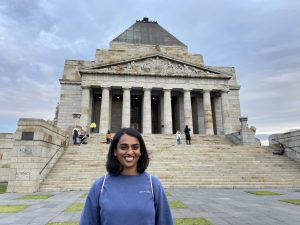BBL Speaker Series: On the Politics of Algorithmic Accountability: Comparing the Impacts of AI on Financially Vulnerable Communities in India and the US

Speaker: Divya Ramesh, PhD candidate, Computer Science and Engineering, University of Michigan, Ann Arbor
Location: HBK 2105 and Zoom
Abstract: Algorithmic accountability ensures that the design, development, and use of AI systems has public approval and trust. However, barring a few success stories, accountability as a governance mechanism to ensure public trust in AI remains elusive. Recent work suggests that accountability mechanisms may be effective in a handful of democratic, rich, and western contexts. Algorithmic accountability also relies on the support of a critical public, watchdog journalism and strong institutions; these conditions are not universally available or true. How does algorithmic accountability mediate in contexts when one or more preconditions are not true? How do vulnerable users of AI systems perceive their relations to algorithmic accountability in such contexts?
In this talk, I will present two examples from my research that give a glimpse into how AI-based decisions govern financially vulnerable communities in India and the US; and how such communities perceive their relations to algorithmic accountability. Placing the two case studies in conversation with one another does two things: 1) nudges us to examine the political nature of algorithmic accountability, and 2) raises questions about the extent to which our current accountability proposals address the needs of vulnerable communities around the world. I will conclude by re-centering the politics of technical questions in human-centered AI, and proposing alternative governance approaches that could better address the needs of vulnerable communities and rebuild their trust in AI.
Bio: Divya Ramesh is a PhD candidate in Computer Science and Engineering at the University of Michigan, Ann Arbor, where she examines the social, ethical, and design implications of AI in high stakes decision-making domains. Her dissertation situates empirical work on financially vulnerable communities in India and the US within theories of human-computer interaction and science and technology studies to inform design and policy for Responsible AI.
Divya’s work has appeared in both HCI and AI venues such as ACM CHI, FAccT, DIS, TOCHI and AAMAS. She received a Best Paper nomination and Pragnesh Jay Modi Best Student Paper award at AAMAS 2020. Divya has also contributed to public conversations via media outlets such as CNBC TV18 and Techcrunch, one of which helped shape policy outcomes for Google in 2023. Divya was recognized as an inaugural Quad Fellow by the governments of Australia, India, Japan and the US in 2023. She was also recently recognized as a Barbour Scholar by the University of Michigan for 2024-25. In a previous life, Divya was a computer vision engineer at a startup called CloudSight, where architected the company’s first human-AI interaction pipeline for analyzing visual content in real-time.


